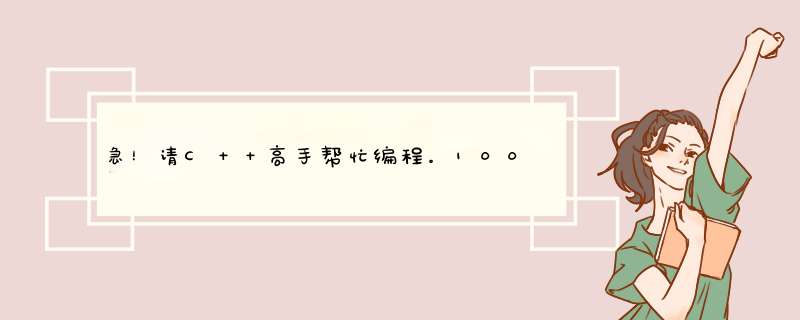
int b[]={15,16,-23,7,-5,19,-2,0,28,11}
然后调用你定义的函数,在主函数中输出数组b中小于零元素的个数。
*/
#include "iostream.h"
int z=0//零的个数
int count(int a[],int n)
{
int dl=0//大于0的个数
int i
for(i=0i<ni++)
{
if(a[i]>0)
dl++
else if(a[i]==0)
z++
}
return dl
}
void main()
{
int n,x
int b[]={15,16,-23,7,-5,19,-2,0,28,11}
n=10
x=n-count(b,n)
x=x-z
cout<<"less than zero number="<<x<<endl
}
/*(2)写两个函数,分别求两个整数的最大公约数和最小公倍数,
用主函数调用这两个函数并输出结果。两个整数由键盘输入。
利用最大公约数求最小公倍数
由于两个数的乘积等于这两个数的最大公约数与最小公倍数的积。这就是说,求两个数的最小公倍数,可以先求出两个数的最大公约数,再用这两个数的最大公约数去除这两个数的积,所得的商就是两个数的最小公倍数。
例 求105和42的最小公倍数。
因为105和42的最大公约数是21,
105和42的积是4410,4410÷21=210,
所以,105和42的最小公倍数是210。
*/
#include "iostream.h"
int gys,gbs
int gy(int a,int b)
{
int r
r=a%b
if(r!=0)
{
a=b
b=r
r=a%b
}
return b
}
int gb(int a,int b)
{
int r
r=a*b/gys
return r
}
int main()
{
int a,b,t
cout<<"Input a"<<endl
cin>>a
cout<<"Input b"<<endl
cin>>b
if(a==0 || b==0)
{
cout<<"Input Error"<<endl
return 0
}
if(a<b)
{
t=aa=bb=t
}
gys=gy(a,b)
gbs=gb(a,b)
cout<<"gys="<<gys
cout<<"gbs="<<gbs
}
/*(3)求方程ax2+bx+c=0的根,用三个函数分别求当b2-4ac大于0、
等于0和小于0时的根,并输出结果。从主函数出入a、b、c的值,
编程求解该方程的根。
*/
#include "iostream.h"
#include <math.h>
void dy(double a,double b,double c,double derta)
{
double d
double x1,x2
if(a==0)
{
x1=-c/b
x2=-c/b
}
else
{
d=pow(derta,0.5)
x1=(-b+d)/2/a
x2=(-b-d)/2/a
}
cout<<"x1="<<x1<<endl
cout<<"x2="<<x2<<endl
}
void deng(double a,double b,double c, double derta)
{
dy(a,b,c,derta)
}
void xiao(void)
{
cout<<"no answer!"<<endl
}
int main()
{
double a,b,c
double derta
cout<<"Input a"<<endl
cin>>a
cout<<"Input b"<<endl
cin>>b
cout<<"Input c"<<endl
cin>>c
derta=b*b-4*a*c
if( derta>0)
{
dy(a,b,c,derta)
}
else if(derta==0)
{
deng(a,b,c,derta)
}
else // derta<0
{
xiao()
}
}
/*(4)写一个判素数的函数,在主函数输入一个整数,输出是否素数的信息
*/
#include "iostream.h"
#include <math.h>
int compare(int n)
{
int b=1
int i
if(n==2 || n==1)
{
}
else
{
for(i=2i<=ni++)
{
if(n%i==0)
{
b=0
break
}
}
}
return b
}
int main()
{
int n
cout<<"Input n"<<endl
cin>>n
if(compare(n)==1)
{
cout<<"this number is prime number!"<<endl
}
else
{
cout<<"this number is not prime number!"<<endl
}
}
/*(1) 编写一个函数,实现两个整数的交换。如:主调函数中
int a=10
int b=20
使用引用作为函数的参数,交换后为:
a=20
b=10
*/
#include "iostream.h"
void change(int &a,int &b)
{
int t
t=a
a=b
b=t
}
void main()
{
int a=10
int b=20
change(a,b)
cout<<"a="<<a<<"\nb="<<b<<endl
}
/*(2) 编程实现两个字符串的交换。如:
char *p1=”hello”
char *p2=”good”
使用引用作为函数的参数,交换后为:
p1: ” good”
p2:” hello”
*/
#include "iostream.h"
#include "stdio.h"
#include "string.h"
void change(char *&p1,char *&p2)
{
char *t1
t1=p1
p1=p2
p2=t1
}
void main()
{
char *p1="hello"
char *p2="good"
change(p1,p2)
cout<<"p1="<<p1<<"\np2="<<p2<<endl
}
void exchange(int a[],int n){
int max = a[0],min = a[0],maxIndex=0,minIndex=0
for(int i=1i<n++i)
{
if(a[i] >max){max = a[i]maxIndex = i}
if(a[i] <min){min= a[i]minIndex = i}
}
int tmp = a[maxIndex]
a[maxIndex] = a[minIndex]
a[minIndex] = tmp
}
#include <stdio.h>#include <string.h>
void main()
{
char a[] = "hello"
char b[100]
memset(b, 0, sizeof(b))
strcpy(b, a)
strcat(b, "world!")
printf("%s\n", b)
}
5个函数,余猜滚竖余memset,sizeof,strcpy,strcat,printf,个个常兆烂用。
欢迎分享,转载请注明来源:内存溢出

 微信扫一扫
微信扫一扫
 支付宝扫一扫
支付宝扫一扫
评论列表(0条)